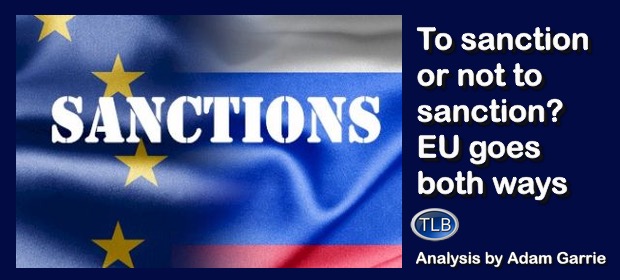
Europe is both for and against Russian sanctions simultaneously
ADAM GARRIE
Europe’s confusion is costing the EU economy a great deal while having little effect on Russia or the United States. Thus, in spite of German manufacturing excellence, the EU is largely geopolitically impotent.
The EU’s position on Russia is best summarised as a combination of an extremely self-serving attitude that is in constant ricochet with a fanatical Russophobic ideology, which itself is owed to the contrasting forces of 19th century European pride, a pride which sees the central European powers as an economic counterweight to Russia, combined with the ultra-nationalism of countries like Poland and the revived fascism in the Baltic states. All of this is of course happening as Europeanist Germany is rowing with ultra-nationalist Poland over internal European affairs as the wider world sits back and laughs at the ignominious nature of the Berlin-Warsaw disputes which centre around Polish legal reforms and the refusal of Poland to house illegal, mainly African migrants.
Europe showed that its ideological Russophobic zeal has limits when US sanctions threatened to undermine the commercial endeavours of big European firms who work with Russian firms on joint energy projects, most prominently Nord Stream II.
However, at the same time, Europe has been embroiled in a non-scandal of their own making involving the sale of energy turbines made by the giant German consortium Siemens which were recently purchased by Russia.
These sanctions were slammed as illegal according to international law by Russia. According to the Russian Ministry of Energy,
“Political ambitions must not be an obstacle for the governments to fulfill commitments to the citizens”.
By allowing the small and often times backward economies of Eastern Europe to define an increasingly self-defeating policy which fails to accept that Crimea is, as it has been for most of modern history, part of Russia, the EU is setting itself up for a situation that will hurt only its own economy.
If the US enforces its sanctions, which would prohibit European companies from going through with existing commercial endeavours with Russian firms, it would behove Europe to end its own sanctions against Russia in order to gain leverage in a trade war with the United States that some European officials believe is forthcoming.
If the EU continues to pick and choose sanctions, it will realise that, when compared to Russia and the United States, it has little geopolitical clout in spite of its economic strength which relies mostly on Germany in any case.
The EU can choose Russia or the United States and, perhaps in the future, a bit of both. It simply cannot choose neither, but if the US and EU continue to be at loggerheads over Washington’s sanctions and Brussels continues to value the Eastern European love affair with Ukrainian fascism more than simple market economics, the European Union will end up isolating itself on all sides of its economy.
Who could be so foolish as to wish that upon one’s self?
************
Original article
ER recommends other articles by The Duran
About the author
Adam Garrie is Managing Editor at The Duran




